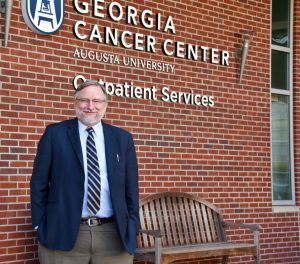GCC’s Pharmacogenomics Program may help reduce side effects from chemotherapy for some patients
The Georgia Cancer Center Pharmacogenomics Program (CaPP) has launched its pharmacogenomics testing services for Georgia Cancer Center patients and oncologists. Pharmacogenomics employs genetic sequence alterations in drug metabolism genes to predict toxicity.
These genetic tests are done to measure changes in genes that make proteins that metabolize common chemotherapy drugs. If a patient has a mutation in these genes, their metabolism will not handle the drug properly. This may cause the patient to become sick.
Dr. John Henson, director of neuro-oncology at the Medical College of Georgia and the Georgia Cancer Center

The program is co-led by Dr. Katherine Saunders-Wohlfrom in Oncology Pharmacy and Dr. John W Henson in the Hereditary Cancer Clinic.
“These tests can help people avoid severe toxicity from chemotherapy. We want to optimize treatment for patients who need a lower dose when they have any gene mutation,” said Henson.
The initial focus will be on patients with gastrointestinal cancers, in conjunction with Dr. Asha Nayak. Henson said this is where the biggest impact will come right away, and other service lines including breast cancer will benefit as more testing is done.
“This is a valuable message to the community,” said Henson. “CaPP services will include testing support, report interpretation, document management, clinician consultation and patient and family consultation.”
Henson also pointed out the help of Dr. Brandy D. Gunsolus in Clinical Laboratory Science was instrumental in developing the order process.
Georgia Cancer Center’s Cardio-Oncology program gets the gold
March 23rd 2023In the United States, only 27 institutions have been awarded the Gold level “Center of Excellence” by the International Cardio-Oncology Society (IC-OS). The Cardio-Oncology Program at the Georgia Cancer Center is proud to be one of those 27 institutions.
CheckMate-73L To Explore Ipilimumab and Nivolumab Combo in Non-Small Cell Lung Cancer Treatment
August 18th 2021The ongoing CheckMate-73L trial seeks to determine if nivolumab plus ipilimumab following nivolumab plus chemoradiation could become the new standard of care in treating non-small cell lung cancer, says Nagla F. Abdel Karim, MD.

